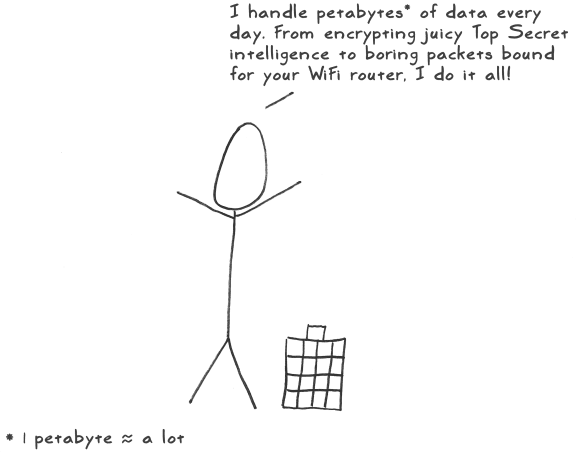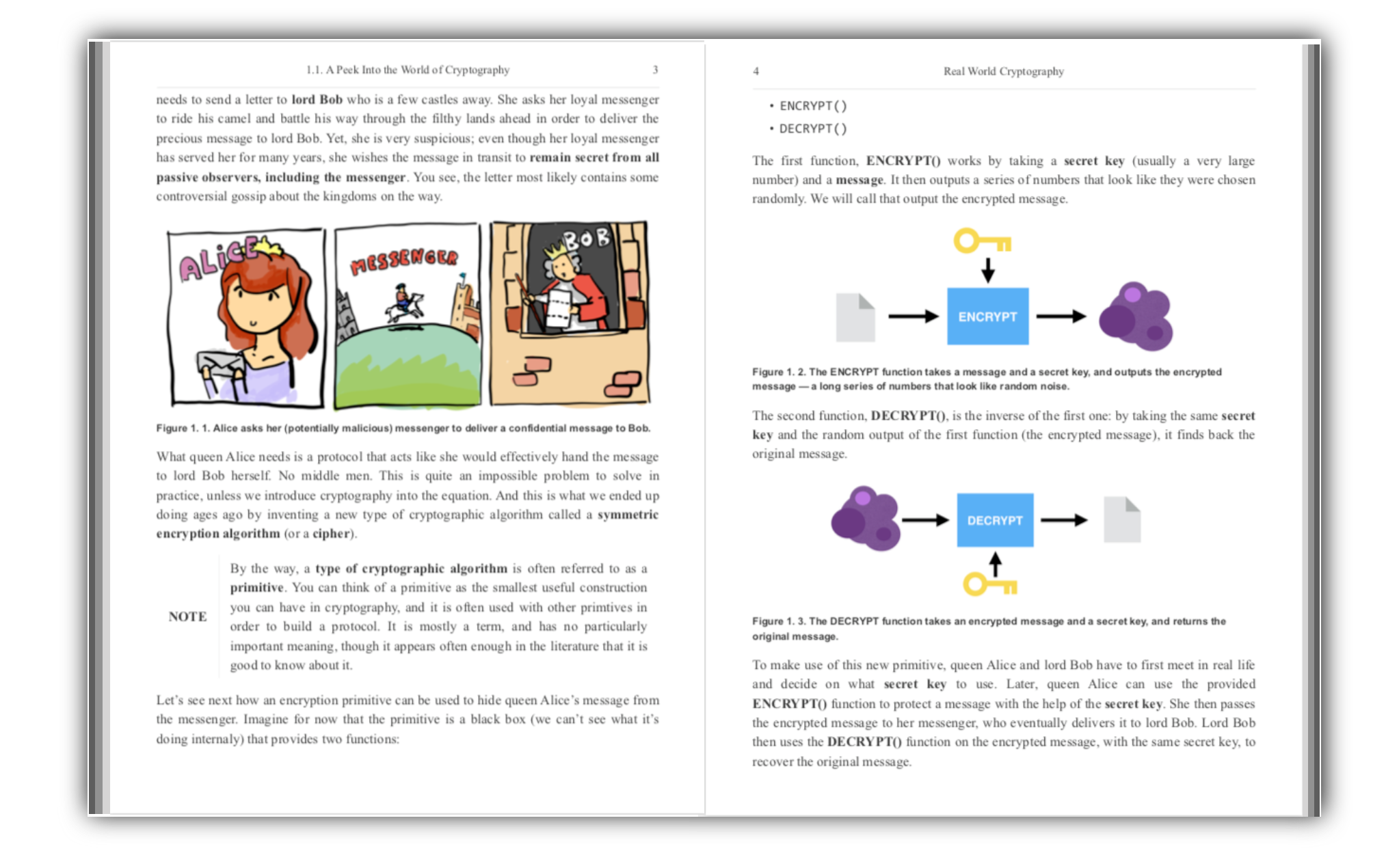A Stick Figure Guide to the Advanced Encryption Standard (AES) posted June 2014

Someone wrote about this awesome explanation of what is AES from scratch on the #crypto channel on freenode. It's pretty nice!
comment on this story
Hey! I'm David, cofounder of zkSecurity and the author of the Real-World Cryptography book. I was previously a crypto architect at O(1) Labs (working on the Mina cryptocurrency), before that I was the security lead for Diem (formerly Libra) at Novi (Facebook), and a security consultant for the Cryptography Services of NCC Group. This is my blog about cryptography and security and other related topics that I find interesting.
Quick access to articles on this page:
more on the next page...

Someone wrote about this awesome explanation of what is AES from scratch on the #crypto channel on freenode. It's pretty nice!
comment on this storyOne of my professor organized a Hacking Week this semester but I didn't have time to do it. Since I'm in holidays I thought I would take a look at it and write a bit about how I solved them.
Here's the Crypto Challenge number 2 (out of 5) from this CTF (Capture The Flag):
user0:$apr1$oTsx8NNn$bAjDZHpM7tCvHermlXKfZ0 user1:$apr1$UxOdpNtW$funTxZxL/8y3m8STvonWj0
user2:$apr1$w7YNTrjQ$0/71H7ze5o9/jCnKLt0mj0 user3:$apr1$AIw2h09/$Ti0TRlU9mDpCGm5zg.ZDP. user4:$apr1$048HynE6$io7TkN7FwrBk6PmMzMuyC. user5:$apr1$T2QG6cUw$eIPlGIXG6KZsn4ht/Kpff0 user6:$apr1$2aLkQ0oD$YRb6aFYMkzPoUCj70lsdX0
You have 7 different users with their respective password hashed and you have to find them. It's just the 2nd out of 5 crypto problems, it's pretty basic, but I never brute forced passwords for real before (I remember using John The Ripper when I was in middle school but that's for script kiddies).
What's Apr1 ? It's a hash function that uses md5. And md5 is pretty weak, lots of rainbow tables on google.
This is how Apr1 looks in PHP according to Wikipedia, also the passwords are supposed to be alpha (a to z) in lowercase.
function apr1($mdp, $salt) {
$max = strlen($mdp);
$context = $mdp.'$apr1$'.$salt;
$binary = pack('H32', md5($mdp.$salt.$mdp));
for($i=$max; $i>0; $i-=16)
$context .= substr($binary, 0, min(16, $i));
for($i=$max; $i>0; $i>>=1)
$context .= ($i & 1) ? chr(0) : $mdp{0};
$binary = pack('H32', md5($context));
for($i=0; $i<1000; $i++) {
$new = ($i & 1) ? $mdp : $binary;
if($i % 3) $new .= $salt;
if($i % 7) $new .= $mdp;
$new .= ($i & 1) ? $binary : $mdp;
$binary = pack('H32', md5($new));
}
$hash = '';
for ($i = 0; $i < 5; $i++) {
$k = $i+6;
$j = $i+12;
if($j == 16) $j = 5;
$hash = $binary{$i}.$binary{$k}.$binary{$j}.$hash;
}
$hash = chr(0).chr(0).$binary{11}.$hash;
$hash = strtr(
strrev(substr(base64_encode($hash), 2)),
'ABCDEFGHIJKLMNOPQRSTUVWXYZabcdefghijklmnopqrstuvwxyz0123456789+/',
'./0123456789ABCDEFGHIJKLMNOPQRSTUVWXYZabcdefghijklmnopqrstuvwxyz'
);
return '$apr1$'.$salt.'$'.$hash;
}It seems pretty difficult to reverse. Let's not forget that hashes are one-way functions and that they also lose information. I don't know if they do lose information on a 7-letters-password though, but it seemed quite stupid to go down this road when I could just brute force it.
What language offers a good library to hash with Apr1? Well I didn't know, and I felt like maybe Unix could do it well for me.
Turns out that OpenSSL has a command line for it:
openssl passwd -apr1 -salt SALT PASSWDA quick bash script later:
#!/bin/bash
test[1]='$apr1$oTsx8NNn$bAjDZHpM7tCvHermlXKfZ0'
salt[1]='oTsx8NNn'
test[2]='$apr1$UxOdpNtW$funTxZxL/8y3m8STvonWj0'
salt[2]='UxOdpNtW'
test[3]='$apr1$w7YNTrjQ$0/71H7ze5o9/jCnKLt0mj0'
salt[3]='w7YNTrjQ'
test[4]='$apr1$AIw2h09/$Ti0TRlU9mDpCGm5zg.ZDP.'
salt[4]='AIw2h09/'
test[5]='$apr1$048HynE6$io7TkN7FwrBk6PmMzMuyC.'
salt[5]='048HynE6'
test[6]='$apr1$T2QG6cUw$eIPlGIXG6KZsn4ht/Kpff0'
salt[6]='T2QG6cUw'
test[7]='$apr1$2aLkQ0oD$YRb6aFYMkzPoUCj70lsdX0'
salt[7]='2aLkQ0oD'
while read line
do
if [ "${#line}" == 7 ]
then
for num in {1..7}
do
noob=$(openssl passwd -apr1 -salt $salt[$num] $line)
if [ "$noob" == "$test[$num]" ];
then
echo $line;
fi
done
fi
done < /usr/share/dict/wordsI read the /user/share/dict/words that contains a simple dictionary of words on Unix, I try only the 7-letters-words.
The test ran in a few minutes and gave me nothing.
Well, I guess with a 7 letters password they must have used gibberish words. Let's try a real bruteforce:
for a in {a..z}
do
for b in {a..z}
do
for c in {a..z}
do
for d in {a..z}
do
for e in {a..z}
do
for f in {a..z}
do
for g in {a..z}
do
truc=$a$b$c$d$e$f$g;
for num in {1..7}
do
noob=$(openssl passwd -apr1 -salt $salt[$num] $truc)
if [ "$noob" == "$test[$num]" ];
then
echo $truc;
fi
done
done
done
done
done
done
done
doneIt ran and ran and... nothing.
Well. Let's not spend too much on this. There is John The Ripper that does this well and even oclHashcat that does this with the GPU.
Let's create a john.conf with the following to limit the password to 7 letters:
[Incremental:Alpha7]
File = $JOHN/alpha.chr
MinLen = 7
MaxLen = 7
CharCount = 26Let's launch John:
john -i=Alpha7 hackingweek.txt(don't forget to put the hashed password in hackingweek.txt).
Wait and wait and wait.. and get the passwords =)
comment on this storyI got asked this question in an interview. And I knew this question beforehands, and that it had to deal with hashtables, but never got to dig into it since I thought nobody would asked me that for a simple internship.
I didn't know how to answer, in my mind I just had a simple php script that would have looked like this:
$arr = array(-5, 5, 3, 1, 7, 8);
$target = 8;
for($i = 0; $i < sizeof($arr) - 1; $i++)
{
for($j = $i + 1; $j < sizeof($arr); $j++)
{
if($arr[$i] + $arr[$j] == $target)
echo "pair found: ${arr[i]}, ${arr[j]}";
}
}But it's pretty slow, it's mathematically correct, but it's more of a CS-oriented question. How to implement that quickly for machines? The answer is hash tables. Which are implemented as arrays in PHP (well, arrays are like super hash tables) and as dictionaries in Python.
I came up with this simple example in python:
arr = (-5, 5, 3, 1, 7, 8)
target = 8
dic = {}
for i, item in enumerate(arr):
dic[item] = i
if dic.has_key(target - item) and dic[target - item] != i:
print item, (target - item)Voilà! We avoid the n-1! additions and comparisons of the first idea with hash tables (I actually have no idea how fast they are but since most things use hash tables in IT, I guess that it is pretty fast).
comment on this storyOne last exam, ECC, and then I'm free to do whatever I want (no I still haven't found an internship, but I talked with TrueVault, Cloudflare, MatterMark, Spotify and maybe Matasano so this has been a good experience nonetheless).
I stumbled upon the notes of Ben Lynn an ex Stanford's student that took an ECC class there. They're pretty awesome and I kinda want to do something like that on this blog. Maybe next year it's a bit late for that :)
comment on this storyWe're learning a lot of algorithm in my algebre et calcul formel class. One of them is the Toom-Cook algorithm used for multiplication of large integers.
I found a super simple explanation of it on a forum, it helps:
4 commentsSay, we want to multiply 23 times 35.
We write,
p(x) = 2x + 3,
q(x) = 3x + 5.
We are using our realization that any integer can be written as a polynomial.
Here, p(x), represents 23, and q(x), represents 35, when x equals 10.
We write,
p(x)q(x) = r(x).
That is, p(x) times q(x), equals r(x).
So,
(2x + 3)(3x + 5) = ax^2 + bx + c = r(x).
Now,
p(0)q(0) = r(0).
So,
(20 + 3)(30 + 5) = a0 + b0 + c.
Therefore,
c = 15.
Now,
p(1)q(1) = r(1).
Therefore, when we do the substitutions (for x and c),
a + b = 25.
Now,
p(-1)q(-1) = r(-1).
Therefore, when we do the substitutions (for x and c),
a - b = -13.
Now, we already know c, and we just need to find a and b.
We have two linear equations and two unknowns,
a + b = *25,
a - b = -13.
We just add the two equations and we get,
2a = 12.
Therefore,
a = 6.
Now, we can substitute 6 for a in,
a + b = 25,
and we get,
b = 19.
So,
r(x) = 6x^2 + 19x + 15.
Now, we substitute 10 for x in r(x), and we are done,
r(10) = 600 + 190 + 15 = 805.
Believe it or not!
I knew that my principal cryptography professor Gilles Zémor was a GO player.
Which is pretty amazing in itself :)
But this keeps going on.
I have an algebra class this semester, and I'm trying to understand Berlekamp's algorithm. Trying to find videos on youtube about him I discover that he is as well a go player! And doing researches about the game at that! So cool :D
comment on this storyI wanted a recall on how masquerade worked in NAT, and I wanted a fast recall.
What's better than a picture? Nothing of course :D


My book Real-World Cryptography is finished and shipping! You can purchase it here.
If you don't know where to start, you might want to check these popular articles:
Here are the latest links posted:
You can also suggest a link.